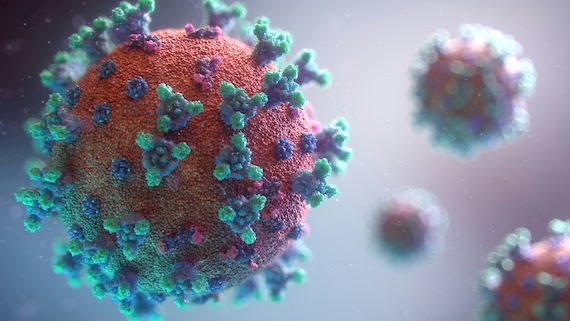By Tulio de Oliveira, Stellenbosch University and Cheryl Baxter, Stellenbosch University
(The Conversation) – Rising temperatures, changing rainfall patterns and extreme weather events create ideal conditions for pathogens and their vectors – such as mosquitoes, midges and ticks – to thrive.
This is confirmed by a recent report for the global climate change conference, COP30. The report was produced by a team of global south scientists from the Climate Amplified Diseases and Epidemics consortium, which studies and figures out ways of responding to infectious diseases that climate change is making worse. It sets out how deadly diseases like West Nile virus, dengue and chikungunya are now spreading to new regions in Africa and Europe because of the changing climate.
Some of the authors of the report, Tulio de Oliveira, Cheryl Baxter and PhD candidate Maambele Khosa, explain what needs to be done to keep people at risk of infection safe and prevent infectious disease from multiplying.
What makes disease risks worse under climate change?
There are several compounding factors. First, pathogens (such as a virus or bacterium that can cause disease) can adapt to new vectors and climates. This was recently seen with chikungunya virus mutations that made it easier for Aedes albopictus – a mosquito species now widespread in Asia, Europe and North America – to spread the virus.
Second, extreme weather events like droughts and floods disrupt ecosystems and human settlements. The disruptions allow waterborne pathogens such as Vibro cholera, which causes cholera, to thrive. Flooding can also enhance breeding sites for vectors and delay public health responses.
Third, climate-driven migration forces millions of people into overcrowded areas without enough water or toilets. This increases their exposure to endemic diseases (diseases that are consistently present within a specific geographic area or population group at an expected and predictable rate). It also sparks the spread of new pathogens.
This problem is especially severe in Africa, where health systems are often under-resourced and populations are highly vulnerable.
What new technology can be used to respond to climate-related epidemics?
Surveillance and genomic tracking are critical tools for early detection and response. Genomic surveillance allows scientists to take samples of the first cases of an outbreak to identify emerging viruses before they cause widespread outbreaks. In other words, genomic surveillance monitors how viruses are evolving in real time. The COVID-19 pandemic system, where genomics were used widely to identify and characterise variants of the virus, can now be used to monitor other pathogens. This approach was effectively used in the recent Marburg outbreak in Rwanda.
Epidemiological and ecological data is used to understand where vectors of disease are situated. Integrating this data with climate and genomic data into early warning systems can help predict where and when outbreaks might occur. For instance, a recent modelling analysis pinpointed the location of midges that transmit the Oropouche virus, then combined this with environmental data (like climate, soil and land use), and was able to predict Oropouche virus resurgence in the Amazon.
Integrating sampling from the environment, animals and humans is known as the One Health approach. Over the last decade, this approach has been used to respond to Rift Valley Fever virus in Kenya.
If nothing is done, what might happen?
In Africa, climate-driven migration is projected to displace up to 113 million people internally by 2050. Without robust preparedness, African health systems will come under significant strain. This is because climate migrants, who have often lost everything, usually settle in areas with limited healthcare infrastructure, poor sanitation, and a high prevalence of infectious disease. This makes outbreaks more likely.
The movement of people can also spread pathogens to new regions. Different countries need to co-ordinate a response as regions, and invest in preparing their health systems for climate-related disease outbreaks. If they don’t, these pressures could lead to frequent epidemics. Climate migrants who have less access to care will suffer most.
What needs to happen next?
Governments must prioritise building healthcare systems that can withstand and respond to climate-related shocks such as floods, wildfires and extreme heat.
Governments must also make sure that everyone has equal access to vaccines and diagnostics. They need to invest in community-based surveillance. This is where local people notice and report outbreaks so that quick action can be taken.
It is very important that low-cost disease diagnosis be available at all local healthcare centres or clinics, even in rural areas, and not just in bigger hospitals. For example, during the COVID-19 pandemic, people could test themselves for the virus at minimal cost.
Sustainable, ongoing funding is essential to support research, capacity building and public health interventions. Regional cooperation is also key in sharing data, coordinating responses and managing migration flows. This can help contain outbreaks and support adaptation.
On 13 November 2025, the COP30 Health Day will promote regional co-operation by presenting the Belém Health Action Plan. This plan supports the implementation of our report’s recommendations. This includes the increase of surveillance and monitoring, evidence-based policies, strategies, capacity-building and innovation. We urge governments to use COP30 to advance the climate and health agenda.

Photo by Fusion Medical Animation on Unsplash
Addressing climate-amplified diseases is important not just for health but as a matter of climate justice. The global south, despite contributing the least to climate change, bears the greatest burden. Governments and private industries that contribute the most to climate change should be held accountable. They must contribute their fair share to the response to climate diseases.![]()
Tulio de Oliveira, Director of the Centre for Epidemic Response and Innovation (CERI) at Stellenbosch University and the KwaZulu-Natal Research Innovation and Sequencing Plaform (KRISP)., Stellenbosch University and Cheryl Baxter, Head Scientific Research Support, Stellenbosch University
This article is republished from The Conversation under a Creative Commons license. Read the original article.


 © 2026 All Rights Reserved
© 2026 All Rights Reserved